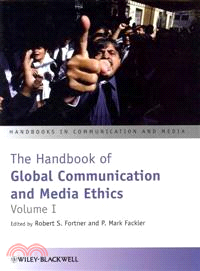The Handbook Of Global Communication And Media Ethics 2Vst
商品資訊
ISBN13:9781405188128
出版社:John Wiley & Sons Inc
作者:Fortner
出版日:2011/04/18
裝訂/頁數:精裝/1040頁
規格:25.4cm*17.8cm*6.3cm (高/寬/厚)
商品簡介
Brings together leading international scholars to consider ethical issues raised by globalization, the practice of journalism, popular culture, and media activities
Examines important themes in communication ethics, including feminism, ideology, social responsibility, reporting, metanarratives, blasphemy, development, and “glocalism”, among many others
Contains case studies on reporting, censorship, responsibility, terrorism, disenfranchisement, and guilt throughout many countries and regions worldwide
Contributions by Islamic scholars discuss various facets of that religion's engagement with the public sphere, and others who deal with some of the religious and cultural factors that bedevil efforts to understand our world
作者簡介
Mark Fackler is Professor of Communication Arts and Sciences at Calvin College. He has taught at Addis Ababa University, Ethiopia, Daystar University, Kenya, and Uganda Christian University (Mukono). Fackler is co-author of Media Ethics: Cases and Moral Reasoning (Longman, 7th edition, 2005) and Good News: Social Ethics and the Press (Oxford University Press, 1993) and has contributed and edited other several books, chapters, and papers on media, ethics, and emerging democracies in East Africa.
目次
Preface.
Introduction.
1. Primordial Issues in Communication Ethics (Clifford G. Christians).
2. Communication Ethics: The Wonder of Metanarratives in a Postmodern Age (Ronald Arnett).
3. Information, Communication and Planetary Citizenship (Luiz Martins da Silva).
4. Global Communication and Cultural Particularisms: The Place of Values in the Simultaneity of Structural Globalization and Cultural Fragmentation – The Case of Islamic Civilization (Bassam Tibi).
5. The Ethics of Privacy in High and Low Technology Societies (Robert S. Fortner).
6. Social Responsibility Theory and Media Monopolies (Mark Fackler).
7. Ethics and Ideology: Moving from Labels to Analysis (Lee Wilkins).
8. Fragments of Truth: The Right to Communicate as a Universal Value (Philip Lee).
9. Glocal Media Ethics (Shakuntala Rao).
10. Classical Liberal Values (Horacio Spector).
11. Feminist Ethics and Global Media (Linda Steiner).
12.Words as Weapons: A History of War Reporting 1945 to the Present (Richard Keeble).
13. Multi-Dimensional Objectivity for Global Journalism (Stephen Ward).
14. New Media and an Old Problem: Promoting Democracy (Deni Elliott and Amanda Decker).
15. The Dilemma of Trust (Ian Richards).
16. The Ethical Case for Blasphemy (Neville Cox).
17. The Medium is the Moral (Michael Bugeja).
18. Development Ethics: The Audacious Agenda (Chloe Schwenke).
19. Indigenous Media Values: Cultural and Ethical Implications (Joe Grixti).
20. Foucault’s Challenge to Ethics (Ed McCluskie).
21. Ethical Anxieties in the Global Public Sphere (Robert S. Fortner).
22. Universalism and Communitarianism in Media Ethics (Clifford G. Christians).
23. Responsibility of Net Users (Raphael Cohen-Almagor).
24. Media Ethics and International Organizations (Cees Hamelink).
25. Making the Case for What Can and Should Be Published (Bruce W. Swaffield).
26. Ungrievable Lives. Global Terror and the Media (Giovanna Borradori).
27. Journalism Ethics in the Moral Infrastructure of a Global Civil Society (Robert S. Fortner).
Volume 2: Practices and Case Studies.
1. Problems of Application (Mark Fackler).
2. Disenfranchised and Disempowered: How the Globalized Media Treat Their Audiences – The Case of India (Anita Dighe).
3. Questioning Professional Ethics in the Global Age: How Japanese Journalists Report and Support Immigrant Law Revision (Kaori Hayashi).
4. Ancient Roots and Contemporary Challenges: Asian Journalists Try to Find the Balance (Jiafei Yin).
5. Understanding Bollywood (Vijay Mishra).
6. Kenyan Muslim Women in Media and Politics: Fighting for Legitimacy (Esha Faki Mwinyihaji).
7. Peace Communication in Sudan: Toward Infusing a New Islamic Perspective (Haydar Badawi Sadig & Hala Asima Guta).
8. Media and Post-Election Violence in Kenya (Mark Fackler, Levi Obonyo, Mitchell Terpstra,& Emmanuel Okaalet).
9. Ethics of Survival: Media, Palestinians, and Israelis in Conflict (Oliver Witte).
10. Voiceless Glasnost: Responding to Government Pressures and Lack of a Free Press Tradition in Russia (Victor Akhterov).
11. Media Use and Abuse in Ethiopia: A Case Study (Zenebe Beyene).
12. Collective Guilt as a Response to Evil: A Case of Arabs and Muslims in the Western Media (Rasha Abdulla).
13.Journalists as Witnesses to Violence and Suffering (Amy Richards & Jolyon Mitchell).
14. Reporting on Religious Authority Complicit with Atrocity (Paul Soukup).
15. The Ethics of a Very Public Sphere: Differential Soundscapes and the Discourse of the Streets (Robert S. Fortner).
16. The Ethics of Representation and the Internet (Boniface Omachonu Omatta).
17. Authors, Authority, Ownership and Ethics in Digital Media and News (Jarice Hansen).
18. Ethical Implications of Blogging (Bernhard Debatin).
19. Journalism Ethics in a Digital Network (Jane Singer).
20. Now Look at What You Made Me Do: Violence and Media Accountability (Peter Hulm).
21. Protecting Children from Harmful Influences of Media through Formal and Non-Formal Media Education (Asbjørn Simonnes & Gudmund Gjeltsen).
22. Ethics and International Propaganda (Philip M. Taylor).
23.Modernization and Its Discontents: Ethics, Development and the Diffusion of Innovations (Robert S. Fortner).
24. Communication Technologies in the Arsenal of Al Qaeda and the Taliban: Why the West Isn’t Winning the War on Terror (Haydar Badawi Sadig, Roshan Noorzai, and Hala Asmina Guta).
25. The Hijab (Patrick Savidan).
Index.
Volume II: Practices and Case Studies.
27. Problems of Application (P. Mark Fackler).
28. Disenfranchised and Disempowered: How the Globalized Media Treat Their Audiences – A Case from India (Anita Dighe).
29. Questioning Journalism Ethics in the Global Age: How Japanese News Media Report and Support Immigrant Law Revision: (Kaori Hayashi).
30. Ancient Roots and Contemporary Challenges: Asian Journalists Try to Find the Balance (Jiafei Yin).
31. Understanding Bollywood (Vijay Mishra).
32. Peace Communication in Sudan: Toward Infusing a New Islamic Perspective (Haydar Badawi Sadig and Hala Asmina Guta).
33. Media and Post-Election Violence in Kenya (P. Mark Fackler, Levi Obonyo, Mitchell Terpstra , and Emmanuel Okaalet).
34. Ethics of Survival: Media, Palestinians, and Israelis in Conflict (Oliver Witte).
35. Voiceless Glasnost: Responding to Government Pressures and Lack of a Free Press Tradition in Russia (Victor Akhterov).
36. Media Use and Abuse in Ethiopia: A Case Study (Zenebe Beyene).
37. Collective Guilt as a Response to Evil: The Case of Arabs and Muslims in the Western Media (Rasha A. Abdulla and Mervat Abou Oaf).
38. Journalists as Witnesses to Violence and Suffering (Amy Richards and Jolyon Mitchell).
39. Reporting on Religious Authority Complicit with Atrocity (Paul A. Soukup, SJ).
40. The Ethics of Representation and the Internet (Boniface Omachonu Omatta).
41. Authors, Authority, Ownership, and Ethics in Digital Media and News (Jarice Hanson).
42. Ethical Implications of Blogging (Bernhard Debatin).
43. Journalism Ethics in a Digital Network (Jane B. Singer).
44. Now Look What You Made Me Do: Violence and Media Accountability (Peter Hulm).
45. Protecting Children from Harmful Influences of Media through Formal and Non-Formal Media Education (Asbjørn Simonnes and Gudmund Gjeltsen).
46. Ethics and International Propaganda (Philip M. Taylor).
47. Modernization and Its Discontents: Ethics, Development, and the Diffusion of Innovations (Robert S. Fortner).
48. Communication Technologies in the Arsenal of Al Qaeda and Taliban: Why the West Is Not Winning the War on Terror (Haydar Badawi Sadig Dhahran), Roshan Noorzai, and Hala Asmina Guta).
49. The Ethics of a Very Public Sphere: Differential Soundscapes and the Discourse of the Streets (Robert S. Fortner).
Index.
主題書展
更多書展今日66折
您曾經瀏覽過的商品
購物須知
外文書商品之書封,為出版社提供之樣本。實際出貨商品,以出版社所提供之現有版本為主。部份書籍,因出版社供應狀況特殊,匯率將依實際狀況做調整。
無庫存之商品,在您完成訂單程序之後,將以空運的方式為你下單調貨。為了縮短等待的時間,建議您將外文書與其他商品分開下單,以獲得最快的取貨速度,平均調貨時間為1~2個月。
為了保護您的權益,「三民網路書店」提供會員七日商品鑑賞期(收到商品為起始日)。
若要辦理退貨,請在商品鑑賞期內寄回,且商品必須是全新狀態與完整包裝(商品、附件、發票、隨貨贈品等)否則恕不接受退貨。
























